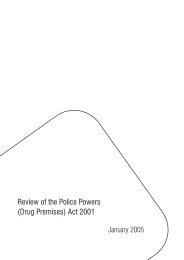Crimes (Forensic Procedures) Act 2000 - NSW Ombudsman - NSW ...
Crimes (Forensic Procedures) Act 2000 - NSW Ombudsman - NSW ...
Crimes (Forensic Procedures) Act 2000 - NSW Ombudsman - NSW ...
Create successful ePaper yourself
Turn your PDF publications into a flip-book with our unique Google optimized e-Paper software.
Other reviews of forensic procedures legislation have considered whether mass screenings need to be more closely<br />
regulated. The Standing Committee on Law and Justice recommended that the Attorney General consider amending<br />
the <strong>Act</strong> so that police would have to obtain a court order before conducting a mass screening, and would have to<br />
satisfy the court that it was justified in all the circumstances, taking into account whether a smaller number of potential<br />
suspects could instead be tested, and whether any other less intrusive investigative means are available. 704 The<br />
Australian Law Reform Commission considered it necessary “to ensure that individuals who would not otherwise be<br />
considered suspects in a criminal investigation do not feel undue pressure to ‘volunteer’ for a forensic procedure in<br />
order to eliminate themselves from potential suspicion,” but decided against requiring court orders to authorise mass<br />
screenings. Instead, it recommended (in the context of the equivalent federal legislation) that the government develop<br />
guidelines for mass screenings, to cover both the process for approving the screening and the manner in which it is<br />
to be conducted. 705<br />
One of the difficulties in regulating mass screenings is that the term is difficult to define. Wee Waa is a clear example<br />
of a mass screening. However, there are other circumstances where police officers seek DNA samples from a smaller<br />
group of people over a period of time, as the investigation progresses, rather than masses of people who have only a<br />
very tenuous connection to the crime, if any.<br />
In addition, we note that mass screenings are expensive to run and may not be the most effective investigative<br />
strategy. Police officers are required, in accordance with the <strong>Act</strong>, to provide each volunteer with the relevant<br />
information, obtain his or her written consent, electronically record the procedure and so on. The samples then have<br />
to be sent to the laboratory for analysis. Given that mass screenings are so resource intensive, and may be of limited<br />
investigative value, it would be hoped that police would not conduct a Wee Waa style mass screening unless it was<br />
reasonably necessary and had been approved at a fairly senior level within <strong>NSW</strong> Police. We note that no Wee Waa<br />
style mass screenings have been conducted in New South Wales since the volunteer provisions of the <strong>Act</strong> came<br />
into force.<br />
Our primary concern about police conducting mass screens is whether the testing officers are providing accurate<br />
advice to volunteers, and consequently whether volunteers are giving properly informed consent. In particular, police<br />
are likely to tell volunteers that their profile will only be used to eliminate them from suspicion, and will not be used<br />
for any other purpose. However, we know that DAL puts all volunteer samples on the DNA database, and does not<br />
destroy them unless the volunteer makes a written request to <strong>NSW</strong> Police that the sample be destroyed.<br />
We are also concerned that, unlike suspects, people who participate in mass screenings as volunteers need not be<br />
informed that the procedure may produce evidence against them. 706 This was discussed previously at 6.1.4. This<br />
would be adequately addressed by our recommendation 11, that police be required to inform all volunteers that the<br />
forensic procedure may produce evidence against them, which can be used in court.<br />
Mass screen volunteers, like people of interest, differ from ‘true’ volunteers in that they are asked to provide a DNA<br />
sample because they are potential suspects, not because they have a legitimate reason for their DNA being at the<br />
crime scene. In our view, police officers should be required by law to inform all volunteers that the forensic procedure<br />
may produce evidence against them, which might be used in a court or law.<br />
Otherwise, we agree with the position of the Australian Law Reform Commission, that there should be guidelines<br />
covering the process for approving mass screenings, and the manner in which they are to be conducted.<br />
The guidelines should also clarify what constitutes a mass screening, and what information should be provided<br />
to mass screen volunteers. In our view, given the special nature of mass screenings, it is appropriate they are<br />
adequately regulated.<br />
<strong>NSW</strong> <strong>Ombudsman</strong><br />
DNA sampling and other forensic procedures conducted on suspects and volunteers under the <strong>Crimes</strong> (<strong>Forensic</strong> <strong>Procedures</strong>) <strong>Act</strong> <strong>2000</strong> 125

















